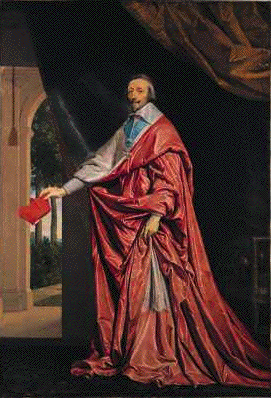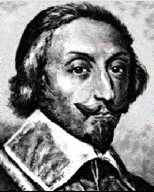September 9: The “Red Eminence” and Religion
Cardinal Richelieu (1585)
It was on this date, September 9, 1585, that Armand Jean du Plessis, Cardinal-Duc de Richelieu et de Fronsac, who achieved prominence during the reign of French King Louis XIII as Cardinal Richelieu, was born in Paris, the son of Maria de' Medici. Originally trained for a military career, his brother's resignation from the Bishopric of Luçon persuaded him to don a clerical collar, instead. He became a bishop in 1607, before his 22nd birthday. As he began his political career, Richelieu was one of the first proponents of tax exemption for the churches.
He became Secretary of State in 1616, and Pope Gregory XV made him a cardinal in 1622. Although he neutralized the political power of Protestants (Huguenots) within France, Richelieu made compacts of convenience with Protestants when necessity demanded, much to the consternation of Rome and French Catholics. Indeed, he was reviled in Spain as the "Cardinal of the Huguenots," but praised in France as l'Éminence rouge ("the Red Eminence"), from the red shade of his cardinal's clerical dress and his style as cardinal. The Thirty Years War had begun between a Europe divided along religious lines, Catholic and Protestant – the Encyclopedia Britannica called it "primarily a religious war, and ... waged with the bitterness characteristic of such wars."[1] – and Richelieu greatly angered Rome by his alliance with the Protestant powers instead of Catholic ones.
Richelieu is acknowledged as one of the greatest statesmen of the seventeenth century, but his independence from Rome in religious and political matters is rarely mentioned in popular histories. He routed the Papal troops from Switzerland, reinstalling Protestant rulers there, and persuaded the French king to break off relations with the Vatican altogether. Indeed, Richelieu threatened to sever the connection with Rome and unite with the Protestants in a French National Church.[2]
Richelieu was no skeptic about religion, but as his political ambitions trumped all other considerations, it is fair to say there was very little depth in his religion. Successful in reshaping France, he virtually invented nationalism, central national authority and a secret police he used to maintain his power and stifle dissent.[3] Richelieu once said, "Harshness towards individuals who flout the laws and commands of the state is for the public good; no greater crime against the public interest is possible than to show leniency to those who violate it" and "If you give me six lines written by the most honest man, I will find something in them to hang him."

Cardinal Richelieu in cardinal's robes and wearing the Order of the Saint-Esprit, looking so much like a secular prince that it is supposed that this was the persona he wished to present to the public. Painting (1633-1640) by Philippe de Champaigne, at the National Gallery, London
Richelieu founded the Académie Française, a brilliant method of unifying the French people by unifying the French language: the Academy decided proper spelling and grammar for French, and what is and is not a proper French word. In the service of his King, Richelieu made successful use of public relations and press censorship, but also managed to alienate the civil service class (by revoking their preferences), the Catholic nobility and the Pope (through his Protestant alliances) – and finally King Louis himself.
The "Iron Cardinal" did not live to see the Peace of Westphalia, which ended the Thirty Years War in 1648, as he died 4 December 1642 in Paris, at age 57. Richelieu stands in retrospect as the first modern politician, often burlesqued in popular media as a power-hungry cynic. But a deeper portrayal of the man would acknowledge his political skills and how through his actions, in which questions of religion and class became secondary to the interests of the nation, he demonstrated the irrelevance of religion in his politics and in his life.
[1] One of the most savage and destructive wars in European history, of the Thirty Years War (1618-1648) the Encyclopaedia Americana says, "few wars have been more calamitous in their general effect on the mass of the people, and the happiness and progress of mankind" and the Cambridge Modern History says the war furnished "the most appalling demonstration of the consequences of war to be found in history." In our time, the religious character of the war, especially in school textbooks redacted out of sensitivity to Roman Catholics, is played down. Yet the powers engaged were Catholic on the one side and Protestant on the other, and the Catholic leaders appealed to the Pope throughout the war for financing, arguing that this was a war to destroy Protestantism! Jesuits, who were the confessors of the Catholic leaders, counseled them to make war to crush heresy, and even followed the generals onto the battlefield to ensure that they did not fail in their fervor.
[2] Pierre Bayle, Dictionaire Historique et Critique (Historical and Critical Dictionary), 1697. Called by some the "Arsenal of the Enlightenment", Bayle's Dictionaire was banned in Catholic France in 1697. It became a bestseller and was reprinted in several editions and translations. Its merciless scientific and philosophical inquiries challenged common assumptions and blind reverence for authority, setting new standards for all future Encyclopedists.
[3] This according to historian and philosopher John Ralston Saul, who called the cardinal the "Father of the modern nation-state, modern centralized power, [and] the modern secret service."
Originally published September 2003 by Ronald Bruce Meyer.


